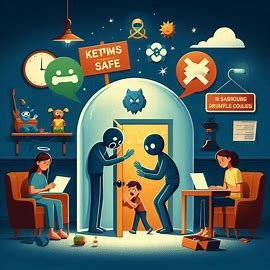Keeping Kids Safe When Parents Are Arguing
Keeping Kids Safe When Parents Are Arguing
Arguments between parents are inevitable, but it’s crucial to ensure that children feel safe and secure during these times. Here are some strategies to help protect your kids when conflicts arise.
1. Stay Calm and Controlled
Children are highly sensitive to their parents’ emotions. Try to keep your tone calm and avoid yelling or using aggressive language. This helps to minimize the stress and fear that children might feel during an argument1.
2. Avoid Physical Confrontations
Physical aggression can be particularly traumatic for children. Make a commitment to resolve conflicts without resorting to physical actions. If things get too heated, take a break and revisit the discussion later2.
3. Reassure Your Children
After an argument, take time to reassure your children that they are safe and that the conflict is not their fault. Explain that disagreements are a normal part of relationships and that you are working on resolving the issue3.
4. Model Healthy Conflict Resolution
Show your children how to handle disagreements constructively. This includes listening to each other, expressing feelings calmly, and finding solutions together. Let them see you apologize and make up, demonstrating that conflicts can be resolved in a healthy way4.
5. Create a Safe Space
If arguments are frequent, establish a safe space where your children can go if they feel scared or overwhelmed. This could be their bedroom, a play area, or even a trusted neighbor’s house5.
6. Seek Professional Help
If conflicts are severe or frequent, consider seeking help from a therapist or counselor. Professional guidance can help you develop better communication and conflict resolution skills, which can benefit the entire family.
By taking these steps, you can help ensure that your children feel safe and secure, even when conflicts arise. Remember, it’s not about never arguing—it’s about handling disagreements in a way that minimizes harm and models healthy behavior for your kids.
1: Greater Good 2: Keep Your Child Safe 3: Safes 4: Keep Your Child Safe 5: Williamsburg Therapy Group : Safes

